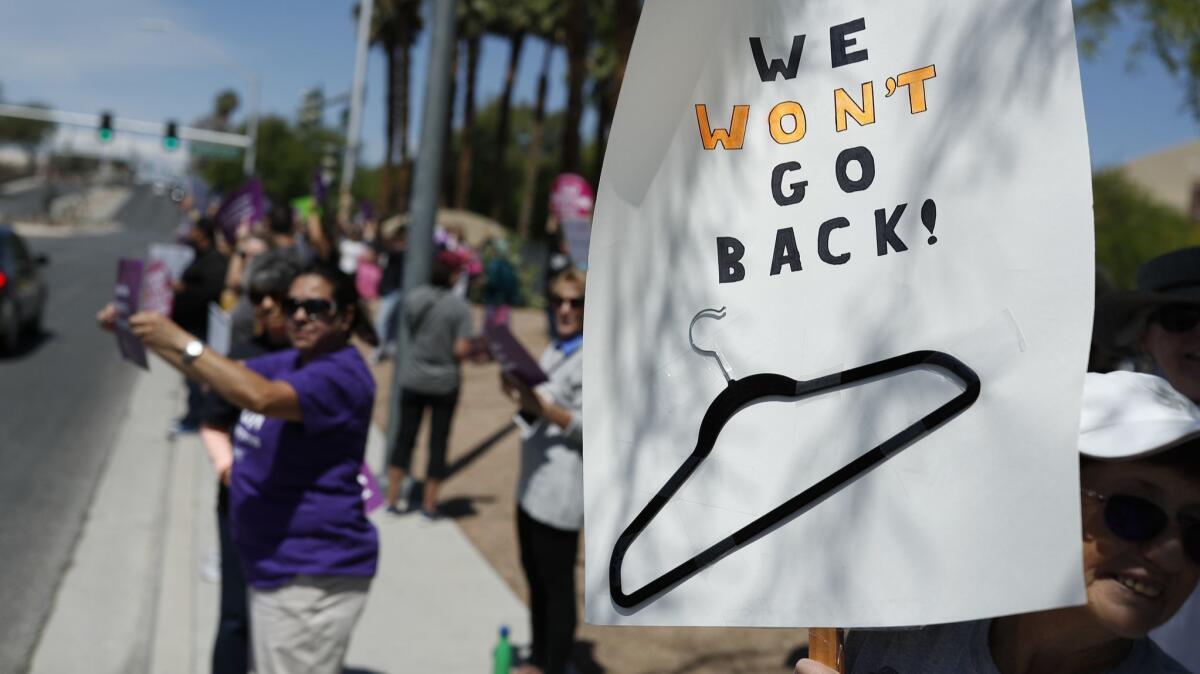Op-Ed: The sky isn’t falling on abortion rights. At least not completely

- Share via
The right to an abortion had a series of boulders dropped on its head these last few weeks as extreme laws banning abortion were enacted in seven states.
But the sky has not fallen. Not completely.
Abortion will remain available in the United States, and that’s true even if the new conservative justices — think of them as the bad boys of the Supreme Court — respond to these harsh new laws by eviscerating Roe vs. Wade.
The truth is, Roe was crippled long ago. In 1992, the Supreme Court decision in Planned Parenthood vs. Casey severely shrank women’s rights by allowing states to restrict access to abortion, as long as the rules they put in place didn’t amount to an “undue burden.”
In the end, reproductive rights will not be won at the Supreme Court but at the ballot box.
Anti-abortion legislation came like a hailstorm: red, purple and even blue states erected obstacles such as requiring women to make multiple trips to a clinic, get unnecessary and sometimes invasive ultrasounds, or listen to demoralizing state-scripted lectures from doctors. These barriers were often insurmountable for those already on the margins: young women, rural women, poor women.
Access to later-term abortions has become increasingly rare. Hostile states have increased the bureaucratic burdens associated with abortion, driving up clinic costs and discouraging doctors, or simply harassing providers out of business, as we’ve seen recently in Missouri. The result is a dramatically limited availability of abortion services in all but the most heavily populated areas.
But the attacks on Roe aren’t the last word. The 1973 decision raised the floor of federal abortion rights; it did not set the ceiling of rights states can offer. Many states had legalized abortion well before Roe. The court expanded federal privacy rights, which emanate like a halo from the Bill of Rights, that had been recognized less than a decade earlier to enable access to contraception for married couples. Overturning Roe will not criminalize abortion at the federal level; it will remove federal protection for abortion rights, leaving each state to decide the issue for itself.
Yes, some states would likely criminalize abortion. Women in those states would be forced to travel far from home to terminate a pregnancy, which could put their health at risk and would increase the cost to them. Ireland last year voted to legalize abortion, putting a stop to women being forced to travel abroad, to England or elsewhere, for abortion services. Requiring American women to travel state to state would be retrograde and stigmatizing.
There is cause for optimism, however. Polling data demonstrate a wide public support for access to abortion, and historically, progressive states have countered the barriers the Supreme Court has OKd. For example, after the court in 1984, in Harris vs. McRae, allowed a near-total federal ban on Medicaid funding for abortion, several states’ constitutions were interpreted to require state government funding that continues today. More recently, in response to President Trump’s inauguration in 2017, Delaware, Illinois and Oregon strengthened their laws protecting abortion access.
Several more states this year are taking action to be a bright light against the gathering federal darkness. At the end of May, Illinois passed its Reproductive Health Act, joining New York, Nevada and Vermont in passing laws this year enshrining abortion rights in state law and/or removing criminal bans from their books. At least five other states have legislation in the pipeline to protect abortion access.
Unfortunately, on the other side, seven states have passed harsh abortion bans this spring alone, going so far as to ban nearly all abortions and to propose severely punishing women and girls who seek abortion services as well as friends or family members who help them.
Enter the Fray: First takes on the news of the minute »
But these state legislators may have hit women’s rights too hard. Trump was elected with the support of white women, and many of them favor abortion rights. Focus groups conducted by the National Institute for Reproductive Health after the election revealed that abortion was just not a priority issue for those voters in 2016. That could change in reaction to these extreme bans.
In the end, reproductive rights will not be won at the Supreme Court but at the ballot box. Women and men can and must do a better job electing state level politicians who vow to expand reproductive rights, and support women’s healthcare, and who are vocal about it.
The proof is in the abortion-protection legislation we’ve seen recently. In New York, a new law turned on the election of just a few new state senators in 2018. And contrast state legislators’ action protecting rights in Illinois with the criminalizing legislation passed in Alabama, or Missouri’s madness with Massachusetts’ pending protections, and it’s obvious what a strong difference a state-level election can make.
It’s time to make some pro-choice noise, Georgia. You too, Kentucky and Missouri. We can keep the sky from total collapse even if the Supreme Court bad boys manhandle Roe, as long as voters in enough states elect representatives who support abortion rights, and hold them to it.
Julie F. Kay is a human rights attorney who has argued for abortion rights in the U.S. and worldwide, including before the European Court of Human Rights in A, B and C vs. Ireland, which spurred liberalization of Ireland’s abortion law by challenging the ban as a human rights violation. She is the board chair for the National Institute for Reproductive Health.
Follow the Opinion section on Twitter @latimesopinion and Facebook
More to Read
A cure for the common opinion
Get thought-provoking perspectives with our weekly newsletter.
You may occasionally receive promotional content from the Los Angeles Times.









